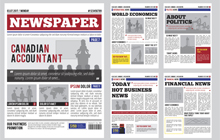Sunday News Roundup 22.10.23: Fines, settlements, jail and more Canadian accounting news

Wrapping up the odds and ends from the past week in Canadian accounting news
Subscribe to our weekly newsletter and get all the week’s stories. Click here to sign up.
TORONTO, October 23, 2022 – Regulatory enforcement of the audit industry was the theme of the past week in the Canadian accounting profession. The week began with the release of this year’s interim inspection results from the Canadian Public Accountability Board (CPAB), which showed that one, unidentified member of the Big Four professional services firms continues to struggle with its audit deficiencies.
The Globe and Mail, which was the first to name the mystery firm as the “problem child” of Canadian auditors, still holds out hope that transparency will triumph at CPAB, but did not shy away from recounting “a rocky couple of years for the Big Four.” (The Financial Post also covered the story.)
Then on Wednesday, the Public Company Accounting Oversight Board in the United States published enforcement actions against three KPMG national affiliates, one of which was KPMG Canada. In our coverage, we focused on the similarities between the actions, and KPMG’s actions in Romania in its audit of a subsidiary of Canadian multinational Celestica.
In the Globe and Mail, a KPMG spokesperson described the issue as an “administrative error,” and a spokesperson for the Canadian Public Accountability Board said there was no Canadian equivalent for the US form that discloses work conducted by local auditors.
One might think this was nothing but a tempest in a teapot, until one reads KPMG flunks US overseas audit inspections twice as often as rivals, in the Financial Times UK, to understand why the PCAOB is concerned. (Going Concern, in its typically blunt style, declared KPMG is twice as bad as other firms.) Not to mention that the fine, which was little more than a slap on the wrist, nevertheless elevated Canadian audit regulation in media reports globally, with its counterparts in Italy and the Netherlands.
And now, on to the rest of the news from the past week in Canadian accounting.
Settlement sought in cannabis company’s funny financial accounting
A confidential settlement offer has been put forth by the Ontario Securities Commission in the case of cannabis company Cronos. The settlement does not appear to include the company’s longtime auditor, KPMG Canada, but alleges the company’s chief financial officer, William Hilson, failed to file accurate financial statements: “In Hilson’s role and as a Chartered Professional Accountant, he understood the need for the transaction to be properly accounted for by Cronos in its interim financial statements.”
Of course, we don’t need to remind accountants that the entire cannabis sector and its accounting standards were rife with problems from the very beginning, or that Al Rosen led the charge, in this publication and in many others.
Canadian accountant crashes in theft from Maritime airport
Sad news out of Gander, Newfoundland, where a former CPA by the name of Gerald Templeman, has been sentenced to two years in jail for embezzling $1.3 million. Apparently Templeman fraudulently claimed a number of expenses and received reimbursement from his employer, Gander International Airport, which provided a range of services to small planes in the area.
CPA NL stripped Templeman of his designation though it hardly matters when someone is jailed.
Liz Truss: The accountant who would be prime minister
Back on September 11th of this year, we wrote: “If you’ve ever believed that nations should be led by accountants, cast your eyes to the UK, where Liz Truss has been elected by the Tories to replace Boris Johnson as Prime Minister. Truss beat rival Rishi Sunak (the former chancellor) and has quickly moved to purge her cabinet of Sunak loyalists. Funny how some words come back to haunt you.
Well, on October 20, Truss became the shortest-serving PM in UK history, just 45 days. Truss delivered a budget that introduced the UK’s biggest tax cuts in 50 years, mostly for corporations and the high net worth individuals, that was mostly financed by further government debt in an overly indebted country. The IMF issued a rare public warning, investors sold of UK assets, and the pound tanked.
Quick Hits: Articles of Interest
Ipsos Reid: More than seven in ten Canadians (72%) believe that the tax burden of individuals is too high; meanwhile eight in ten (80%) think that the rich should be taxed more (Press Release)
What the Liberals and Conservatives get right — and wrong — about the carbon tax (CBC)
Why a business owner who paid himself dividends got into trouble with the CRA (Financial Post)
CRA delays cause tax battle to continue for more than 20 years (Globe and Mail)
How Canadians can use charitable receipts to mitigate up to 75 per cent of their annual net taxes (Globe Advisor)
New working group will review Manitoba's tax systems with aim to make economy more competitive: province (CBC)
By Canadian Accountant staff.









(0) Comments